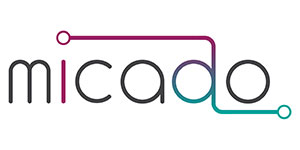
01 Dec Innovative tools for the fourth piloting phase in times of Covid-19
Due to the ongoing Covid-19 pandemic, the organisation of piloting had to be re-thought. Meetings and workshops were hardly possible as in-person events. In this article, the pilot cities reveal how they managed this challenge and which bottlenecks they encountered.
Bologna: The Bologna Local Group opted for a hybrid form: Online tests were organised for public administrations and civil society organizations. While the former received short training sessions, the latter were invited to upload contents related to their organization, add events that will take place in the near future, add timetables and venues for courses. Parallel to these digital formats, the sessions with migrants took place in person. From experience the partners knew that direct communication would be more efficient with migrant communities. In addition, was easy for the migrants to participate since the MICADO team organized the logistics.
In Antwerp, a similar approach was chosen. For the target groups public administrations and civil society organizations, digital testing was realized. Especially new testers in the second half of the public piloting were reached entirely online. Under new Covid-19 regulations, generating the same kind of energy and enthusiasm online as during an offline meeting was experienced to be extremely difficult. For the migrant groups, Antwerp continued to focus on the live explanation of the tool by a frontline worker such as a counsellor or a teacher. This counsellor or teacher usually received his training in a live session as well.
Hamburg: The Hamburg team conducted the majority of the Usability Tests digitally or in small groups in an open space during summertime. The final piloting phase that is happening now is only conducted remotely. Because physical meetings continue to be difficult, close communication via different digital modes (e-mails, calls, social media activities, newsletters) becomes even more crucial. In order to encourage migrant participants, flyers were distributed in selected parts of the city, presenting MICADO and asking for participation. Among the migrant group, hoodies are raffled off as small incentives.
In Madrid, the main dissemination activities could be carried out as originally planned through digital media, using e-mail and social networks in order to share the information with the different target groups.
LESC members, who had participated previously in co-creation and usability tests, non-governmental organizations and civil society organizations all helped to spread the word and encourage people to participate in the piloting. Additionally, the app and survey were shared via social media (Twitter, website, Facebook, Instagram).
Seminars, face-to-face meetings and the dissemination of printed flyers to present the app were affected by the pandemic. However, the team was able to present the app at an event at Rey Juan Carlos University.
To summarize, the Covid-19 pandemic did pose certain, restrictions and had a direct impact on the communication within MICADO and especially on the piloting phase. Since direct, face-to-face communication was hardly realizable, the pilot cities adopted a variety of digital tools to reach their audiences. Social media as well as newsletters and video calls gained a new momentum. Another similarity between the way the cities realized their piloting was the different approach of the target groups. While public administrations and civil society organizations could be reached through digital means, communicating with migrants was more efficient through direct communication.
